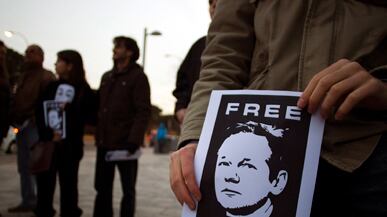As a former sex crimes prosecutor, I'm the last person you might expect to come to the defense of the unsavory WikiLeaks founder, Julian Assange. But the charges that now have him sitting in a British prison reek of opportunism and political expediency, and that does women around the world no good.
That doesn't mean that I think the two women who've accused him of committing sexual offenses last August are lying. One woman said she had consensual sex with Assange, but that the condom broke and he used his body weight to hold her down, presumably to complete the act. She hosted a party for him the next evening. A few days later, Assange had sex with another woman—allegedly while she was asleep—also without wearing a condom. Both women reportedly acknowledged that they freely chose to engage in sex acts with Assange—but that some of his conduct was nonconsensual.
As a general matter, assuming the allegations are true, Assange should be punished because he violated the women's fundamental right to personal autonomy and bodily integrity by acting without their "knowing, intelligent and voluntary" consent.
But just because, in theory, the charges are worth pursuing, doesn't mean we should ignore the context within which the prosecution decision was made.
Put another way, if Assange were any other guy, he would not be sitting in a British jail and there would have been no international manhunt, no matter how many times his condom broke during sex.
Because the public understands this, they also understand that the timing of Assange's arrest on sex charges is suspicious. The charges are either a substitute for a lack of evidence in conjuction with a WikiLeaks indictment, or they're "holding charges" meant to keep the guy penned up while the world figures out where, if anywhere, Assange might actually be prosecutable for the release of government files.
Either way, when prosecutors use the public's money to pursue a criminal case as a pretext for some other agenda, people become cynical and mistrustful of the rule of law. During impeachment proceedings against President Bill Clinton for his lie about Monica Lewinsky, the public was plenty offended by Clinton's behavior, but the impeachment proceedings were so over the top, many came to believe the process was nothing but a contrived show trial, generated by people who couldn't have cared less about presidential lying but who hoped to seize the moment for political gain.
The impeachment effort backfired and not only generated great sympathy for Clinton, but also made the president's political opponents, and their ostensible concern about lying, seem silly.
History could repeat with Assange. Prosecutors in Sweden have so overhandled the sex charges, they look silly—and worse—they make all sex crimes seem trite, an easy tool for political expediency.
Prosecutors in Sweden make all sex crimes seem trite, an easy tool for political expediency.

• Howard Kurtz: Rupert Murdoch’s WikiLeaks Cameo• Complete coverage of WikiLeaksSwedish prosecutors now have a big problem: Sex without a condom is so terrible that scads of law-enforcement officials traveled around the world to bring an offender to justice—but what happens next week, when a woman shows up at the police station to report that her boyfriend kept thrusting after a condom broke during sex? Or how about the wife who wants her husband charged because he put his hands in her PJs while she was sleeping?
In another context, I might support these claims as legitimate sex crimes charges simply to get the message out more clearly in this country that nobody should impose their body parts onto or inside the body of another person without their knowing, intelligent and voluntary consent.
In another context, I'd argue vigorously for wider understanding of the multitude of ways that the American justice system routinely fails to protect women's personal autonomy and bodily integrity by enacting inadequate laws, and failing to enforce the ones we have. For example, in almost every state in this country, rape requires proof not only of nonconsent but also "force." If you take my stuff without my consent, it's called larceny. If you also use force, it's called robbery. But if you take my bodily integrity without my consent, it's not a crime at all, unless you also use force. Non-consent should be enough.
But this case is different. Because as much as I care about fixing rape laws to better respect women's freedom and equality—and as hard as I've fought for more than 20 years to hold offenders accountable as part of that reform work—it hurts rather than helps the cause when prosecutors exploit such a serious topic for unrelated political purposes.
If officials want a piece of Assange, they should charge him with espionage. It might be a tough case in light of First Amendment concerns, but so what? Nobody buys the sex charges anyway and espionage, on these facts, is a more serious offense. Better to try, and to lose, than pursue distracting charges in an unrelated case.
All countries need to do a better job prosecuting rape. But flexing that muscle in this case will do nothing to legitimize the idea that bodily integrity matters. To the contrary, it will establish even more firmly the historically entrenched and offensive idea that the value of a woman's autonomy is measured by the political benefits of prosecuting the man who took it.
Wendy Murphy is a former child abuse and sex crimes prosecutor who teaches at New England Law/Boston. Wendy specializes in the representation of crime victims, women and children. Her expose of the American legal system, And Justice For Some, came out in 2007. A former NFL cheerleader and visiting scholar at Harvard Law School, Wendy lives outside Boston with her husband and five children.






